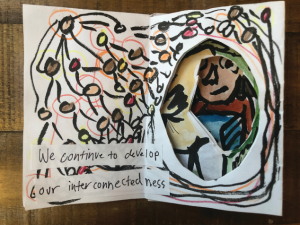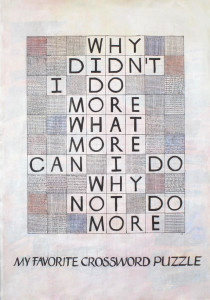Tag : artist
October 23, 2020 by admin
Meet the Black Jewish Artists in Lilith’s Digital Spotlight
This season of quarantine and anti-racist uprising, Lilith has been highlighting Black Jewish feminist artists— visual artists, dancers, musicians—in an exciting and original Instagram campaign. With theaters, concert halls, galleries and other performance spaces shuttered, connecting these talented artists with Lilith’s readers has been a bright spot in a bleak time. Follow Lilith’s Instagram and the Lilith blog for more treats like these!
Rachel Harrison-Gordon is an MFA/MBA candidate at NYU Tisch/Stern and a Sundance 2020 Blackhouse Fellow.
“To the Black girls everywhere, to the mixed girls, to the Black-Jewish girls—your life is special and valid. People will try to put you into a box so their world-view isn’t shook. Don’t let them do that, don’t let that effort subdue or censor who you are. We are all here and have something to offer.”
Ayeola Omolara Kaplan is a queer, Black, multimedia artist creat- ing artworks that empower and educate the Black diaspora and those interested in supporting its liberation… Her artwork consists of paintings, drawings, and films that aim to energize people as well as challenge their current and past perceptions of reality.
“The movement for justice needs to not only include but also amplify the voices of incarcerated people, especially Black incarcerated people. We can never be free while our family members are in cages. There is no healing behind bars.”
Nirit Takele is an Israeli artist who illustrates the daily life of the Beta-Israel community and contemporary Israeli reality, and finds inspiration in old Ethiopian sagas and folk tales remembered from her youth.
“I say this to myself and to anyone who wants to achieve something—always strive towards the goal and take the small steps that will bring you closer to it.”
Jordana Daumec was born in New York City. She trained at Studio Maestro in New York City and Canada’s National Ballet School. Jordana joined The National Ballet of Canada as an RBC Apprentice in 2003 and was promoted to First Soloist in 2015.
“I make my husband and me a loaf [of challah] every week. Such a great way to spend a day. I love the smell of the baking bread, you can see the love that you put into it and it comes out so delicious.”
Jessica Valoris is a multidisciplinary installation artist who weaves together sound, collage, painting, sculpture and facilitated ritual to build installations and experiences that have been described as sacred, intentional, and activated.
“There will always be something important that needs to be addressed, mediated, serviced, facilitated. There is always more work to be done. Saying no is a practice of pausing, recalibrating, and saying yes to myself.”
- No Comments
September 1, 2020 by admin
Black Jewish Women Artists You Should Know… Jordana Daumec
Art–whether it be dancing, painting, drawing, film–creates a space for self-examination, helping us to envision possible futures, and better versions of ourselves. And the Jewish month of Elul is traditionally an opportunity for introspection before the High Holidays of Rosh Hashanah and Yom Kippur.
Recognizing the power of art to be transformative, Lilith is highlighting Black Jewish women artists in this time leading up to and through Elul. On Lilith’s platforms you’ll have a chance to experience, share, and celebrate their work.
You can also participate by letting us know (at info@Lilith.org) Black Jewish women creators we should include!
—-
This week Lilith is featuring Jordana Daumec.
Website: https://national.ballet.ca/Meet/Dancers/1st-Soloists/Jordana-Daumec
Jordana Daumec was born in New York City. She trained at Studio Maestro in New York City and Canada’s National Ballet School. Jordana joined The National Ballet of Canada as an RBC Apprentice in 2003 and was promoted to First Soloist in 2015.
What is the comfort food you’re making during the pandemic?
This is an easy answer, challah! I make my husband and me a loaf every week. Such a great way to spend a day. I love the smell of the baking bread, you can see the love that you put into it and it comes out so delicious. I’m sure we’d eat more than one loaf a week if I made us more.

What is the world calling you to be/do in this moment?
Tackling issues of diversity have always been a calling to me but in this time of the pandemic, when we are all home and have more free time, my focus has been on what I can do for my dance community in a positive and constructive way. Starting conversations, bringing awareness, listening, being active to help make change. It’s really wonderful to see so many people coming together to use this time to make a difference.

For what in your life do you feel most grateful?
This is a hard one to limit to just one thing. I’m grateful for the love and support of my husband and family on a daily basis. With their constant love, I feel like I can accomplish anything. I am also grateful that I am in a profession that I love to do. I get to work with amazing people who have had such an impact on me. An example was getting to work with William Forsythe and Crystal Pite this year. It was career changing! Honestly, I can say I feel the Mazels coming down from the stars.
- No Comments
August 11, 2020 by admin
Black Jewish Women Artists You Should Know…Jessica Valoris
Art–whether it be dancing, painting, drawing, film–creates a space for self-examination, helping us to envision possible futures, and better versions of ourselves. And the Jewish month of Elul is traditionally an opportunity for introspection before the High Holidays of Rosh Hashanah and Yom Kippur.
Recognizing the power of art to be transformative, Lilith is highlighting Black Jewish women artists in this time leading up to and through Elul. On Lilith’s platforms you’ll have a chance to experience, share, buy and celebrate their work.
You can also participate by letting us know (at info@Lilith.org) Black Jewish women creators we should include!
—
 Jessica Valoris is a multidisciplinary installation artist who weaves together sound, collage, painting, sculpture, and facilitated ritual to build installations and experiences that have been described as sacred, intentional, and activated. She’s inspired by Afrofuturism, metaphysics, and historical memory.
Jessica Valoris is a multidisciplinary installation artist who weaves together sound, collage, painting, sculpture, and facilitated ritual to build installations and experiences that have been described as sacred, intentional, and activated. She’s inspired by Afrofuturism, metaphysics, and historical memory.
- No Comments
July 14, 2020 by admin
Everyone Is an Artist
 In April, Lilith Magazine’s staff found themselves discussing the intense feelings of isolation that they were experiencing during quarantine. What practices were we turning to ground ourselves? How were we connecting with friends and family when we could no longer be in the same space together? Two Lilith staff members, Rachel Fadem and Rebecca Katz, discovered a joint love of zine making that allowed them to wrestle with all the uncertainties surfacing at the beginning of the pandemic– and find time for joy. As a result, Lilith’s Jewish Feminist Quaranzines Maker Space was born.
In April, Lilith Magazine’s staff found themselves discussing the intense feelings of isolation that they were experiencing during quarantine. What practices were we turning to ground ourselves? How were we connecting with friends and family when we could no longer be in the same space together? Two Lilith staff members, Rachel Fadem and Rebecca Katz, discovered a joint love of zine making that allowed them to wrestle with all the uncertainties surfacing at the beginning of the pandemic– and find time for joy. As a result, Lilith’s Jewish Feminist Quaranzines Maker Space was born.
On Tuesday, July 14 and July 28, 8-9 PM Eastern, join Lilith to explore questions at the intersection of art, justice, and Judaism through the feminist medium of zines. RSVP Here.
Zine, short for magazine or fanzine, is a self-published work motivated by the self-expression of the creator. From their creation in the 1930s to today, zines have been a radical, disruptive tool dedicated to sharing narrative, voices, and information ignored or erased by mainstream media.
- No Comments
May 8, 2019 by Eleanor J. Bader
Deborah Ugoretz Heals Wounds with Paper Cuts
 Visitors to the Red Hook, Brooklyn, studio of artist Deborah Ugoretz are greeting by a poster-sized crossword puzzle with the words: “Why didn’t I do more/What more can I do/ Why not do more” in large black letters.
Visitors to the Red Hook, Brooklyn, studio of artist Deborah Ugoretz are greeting by a poster-sized crossword puzzle with the words: “Why didn’t I do more/What more can I do/ Why not do more” in large black letters.
Ugoretz says that she made the piece shortly before the 2016 presidential election. Called My Favorite Crossword Puzzle, this piece contains some squares to remind viewers of the problems that continue to plague planet earth: age discrimination, apathy, child abuse, drug addiction, poverty, racism, human trafficking and overdevelopment, among them.
- 1 Comment
 Please wait...
Please wait...